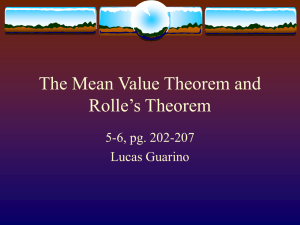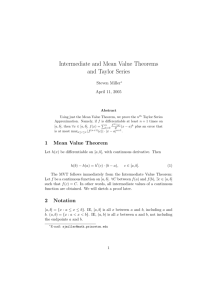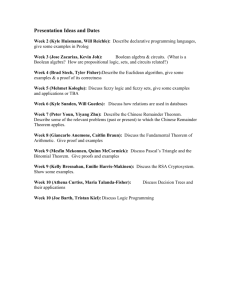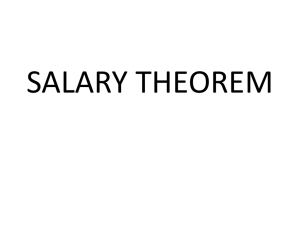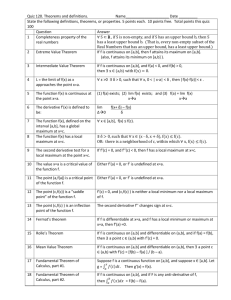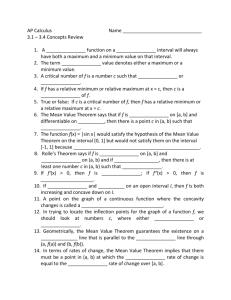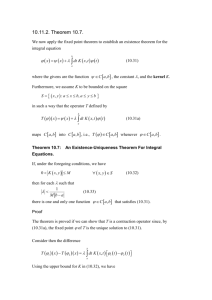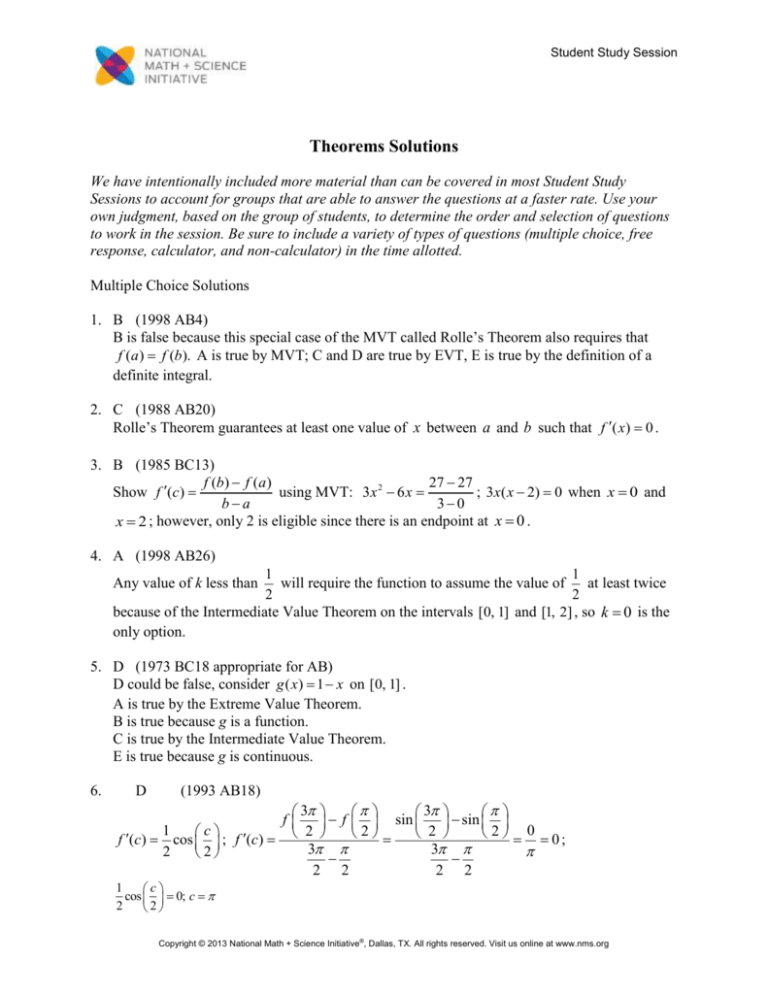
Student Study Session
Theorems Solutions
We have intentionally included more material than can be covered in most Student Study
Sessions to account for groups that are able to answer the questions at a faster rate. Use your
own judgment, based on the group of students, to determine the order and selection of questions
to work in the session. Be sure to include a variety of types of questions (multiple choice, free
response, calculator, and non-calculator) in the time allotted.
Multiple Choice Solutions
1. B (1998 AB4)
B is false because this special case of the MVT called Rolle’s Theorem also requires that
f (a) f (b). A is true by MVT; C and D are true by EVT, E is true by the definition of a
definite integral.
2. C (1988 AB20)
Rolle’s Theorem guarantees at least one value of x between a and b such that f ( x) 0 .
3. B (1985 BC13)
f (b) f (a )
27 27
Show f (c)
using MVT: 3 x 2 6 x
; 3x( x 2) 0 when x 0 and
ba
30
x 2 ; however, only 2 is eligible since there is an endpoint at x 0 .
4. A (1998 AB26)
1
1
will require the function to assume the value of
at least twice
2
2
because of the Intermediate Value Theorem on the intervals [0, 1] and [1, 2] , so k 0 is the
only option.
Any value of k less than
5. D (1973 BC18 appropriate for AB)
D could be false, consider g ( x) 1 x on [0, 1] .
A is true by the Extreme Value Theorem.
B is true because g is a function.
C is true by the Intermediate Value Theorem.
E is true because g is continuous.
6.
D
(1993 AB18)
3
3
f f sin sin
1
2
c
2
2
2 0 0;
f (c) cos ; f (c)
3
3
2
2
2 2
2 2
1
c
cos 0; c
2
2
Copyright © 2013 National Math + Science Initiative®, Dallas, TX. All rights reserved. Visit us online at www.nms.org
Theorems
Student Study Session
7. E (1993 BC44 appropriate for AB)
By the Intermediate Value Theorem, there is a c satisfying a c b such that f (c ) is equal to the
1 b
average value of f on the interval [ a, b] . The average value is also given by
f ( x) dx .
b a a
Equating the two gives option E.
t
Alternatively, let F (t ) f ( x) dx . By the Mean Value Theorem, there is a c satisfying a c b
a
b
F (b) F (a )
F (c) . F (b) F (a) f ( x) dx and F (c) f (c) by the Fundamental
a
ba
Theorem of Calculus. This again gives option E as the answer. This result is called the Mean Value
Theorem for Integrals.
such that
8. B (1969 BC3 appropriate for AB)
1
20
1
y x , so y
. By the Mean Value Theorem,
, so c 1 . The point is (1, 1) .
2 x 40
2 x
9. E (1998 AB91)
I and III are true by IVT; II is true by MVT.
10. E (2008 AB89/BC89)
Since there is no c for which f (c) 0, Rolle’s Theorem is violated and f ( k ) does not exist on
(2, 2).
11. B (2003 AB80)
B could be false since this is a special case of MVT (Rolle’s Theorem) which also requires that
f (a ) f (b) . A and C are true by IVT; D is true by MVT; E is true by EVT.
12. D (1997 BC81 appropriate for AB)
f assumes every value between 1 and 3 on the interval (3, 6) , so f (c) 1 at least once.
Copyright © 2013 National Math + Science Initiative®, Dallas, TX. All rights reserved. Visit us online at www.nms.org
Theorems
Student Study Session
13. 1999 AB3/BC3b
(b) Yes;
Since
, the Mean Value
Theorem guarantees that there is a t,
0 < t < 24 , such that
14. 2009B AB3bc
f (6) f ( a )
(b)
0 when f (a ) f (6) . There
6a
are two values of a for which this is true.
1: answer
2 1: MVT or equivalent
2
1: expression for average rate of
change
1: answer with reason
(c) Yes, a 3 . The function f is differentiable
1: answers “yes” and identifies a 3
on the interval 3 x 6 and continous on
2
1: justification
f (6) f (3) 1 0 1
.
3 x 6 . Also,
63
63 3
By the Mean Value Theorem, there is a
1
value c, 3 x 6 , such that f (c) .
3
15. 2008B AB5/BC5d
2
(d)
1: average value of
1: answer “No” with reason
No, the MVT does not guarantee the existence
of a value c with the stated properties because
is not differentiable for at least one point in
Copyright © 2013 National Math + Science Initiative®, Dallas, TX. All rights reserved. Visit us online at www.nms.org
Theorems
Student Study Session
16. 2007 AB 3ab
(a) h 1 f g 1 6 f 2 6 9 6 3
1: h 1 and h 3
2 1: conclusion, using
IVT
h 3 f g 3 6 f 4 6 1 6 7
Since h 3 5 h 1 and h is continuous, by the
Intermediate Value Theorem, there exists a value r,
1 r 3 , such that h r 5 .
(b)
h 3 h 1 7 3
5
3 1
3 1
h 3 h 1
3 1
2 1: conclusion, using
MVT
1:
Since h is continuous and differentiable, by the Mean
Value Theorem, there exists a value c, 1 c 3 , such that
h c 5 .
17. 2007B AB 6abd
(a) The Mean Value Theorem guarantees that there is
a value c, with
so that
2
1:
1: conclusion, using MVT
(b)
1:
3 1:
1: uses MVT with
Since f is twice-differentiable,
is differentiable
everywhere, so the Mean Value Theorem applied
to
on [2, 5] guarantees there is a value k, with
such that
(d)
2 1: h(2) and h(5)
1: conclusion, using IVT
Since
the Intermediate Value
Theorem guarantees that there is a value r, with
such that
Copyright © 2013 National Math + Science Initiative®, Dallas, TX. All rights reserved. Visit us online at www.nms.org
Theorems
Student Study Session
18. 2002 AB 6c
(c) By the Mean Value Theorem there is a c
with 0 c 0.5 such that
f 0.5 f 0 3 0
f c
6r
0.5 0
0.5
1: reference to MVT for f (or
differentiability of f )
2
1: value of r for interval 0 x 0.5
Copyright © 2013 National Math + Science Initiative®, Dallas, TX. All rights reserved. Visit us online at www.nms.org


